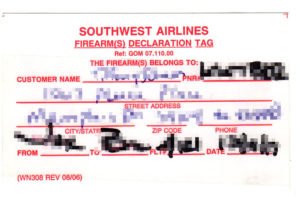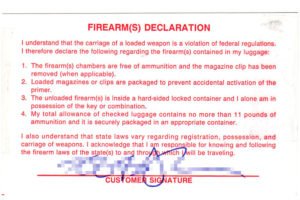Traveling with Firearms
Traveling with firearms can be tricky, especially when you travel across multiple jurisdictions with different laws and policies. Are you just going across town? Are you leaving the county? Visiting any federal buildings? Will you be crossing state lines? Are you traveling by boat or plane? Do you have a carry permit? Is that permit recognized in the state(s) you’ll encounter in your travels?
All of these questions should be at the forefront of your mind whenever you travel with a firearm. There are far too many possibilities to cover here. Federal, state, and local laws are always subject to change, and they often include several exceptions to the general rules. Moreover, private companies and businesses may also have their own policies, including commercial establishments, recreational centers, and common carriers like bus lines, train services, and airlines. Therefore, our number one recommendation to anyone traveling with a firearm is to do the required research, read all the required laws, and if in doubt, always consult an attorney well before your trip.
Of course, CSA is not a law firm, and we cannot and will not ever give anyone any legal advice. Instead, we strongly advise you to do your own due diligence and always ensure that you are in compliance with all local, state, and federal laws and policies that apply to any area through which you plan to travel with a firearm. This may seem like a bit of a chore, but as law-abiding firearms owners, it is our responsibility. Below are a few links to help get you started.
- Tennessee Firearms Statutes (Title 39, Chapter 17, part 13)
- United States Firearm Statutes (Title 18, Part 1, Chapter 44)
- Travel Security Administration (TSA) Firearms Rules
- Handgunlaw.us
- NRA Guide to Interstate Travel with Firearms
- NRA Overview of Tennessee Gun Laws
Below are links to the firearms policies that some of the major air carriers have posted on their websites. In some cases, firearms information is listed under “Sports Equipment” or “Shooting Equipment.”
Typically, when you declare an unloaded firearm at the airport, the gate agent will have you sign a declaration card that certifies that your firearm is unloaded and otherwise in compliance with applicable laws and policies. Once you sign the card, it will be placed in your checked luggage along with the firearm, which should be locked in a hard-sided case. Declaration cards look a little different from airline to airline, but here are two examples.




When traveling by plane, never, ever, ever attempt to pack a firearm of any kind (or ammunition) in your carry-on luggage. If you’re flying with a firearm, always pack the firearm completely unloaded, in a hard case in your checked luggage (NOT in your carry-on). When you approach the ticket counter, politely advise the ticket agent that you “need to declare an unloaded firearm.” Never cavalierly blurt out the words, “I have a gun.” For more information on airline-specific rules for traveling with firearms, always contact your airline well in advance of your trip. We have included several links in the previous section.
We discuss several other travel considerations in our classes. To learn more, please contact the Travel Security Administration or consider taking our Tennessee Handgun Carry course. And once again, with any heavily regulated activity, it’s always a good idea to consult with an attorney if possible. That’s the best way to make sure you fully comply with all applicable travel laws.


